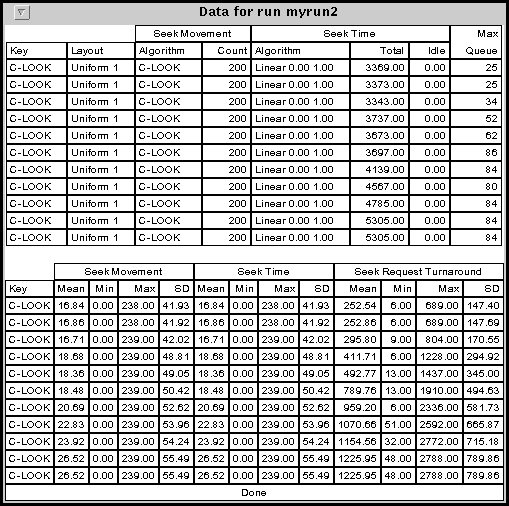- In this recitation you learned how to compile programs on the
Linux system and you write the get_filesize function.
- In this recitation you started using the simulator and got ready for
Assignment 2.
- In this recitation you modified the simulator input to do
5 experiments.
There were 10 processes with short CPU bursts and 10 with longer ones.
The algorithms used were FCFS, SJF, RR 1, RR 5 and RR 10.
You should have found that in this case SJF had the best average waiting time and FCFS was next. Increasing the quantum for the RR produced better average waiting times and if it were allowed to increase above the largest CPU burst it would be identical to FCFS.
- In this recitation you tested your valid_program_line function.
- In this recitation you learned how to compile and run threads under
Linux and Solaris.
- Here you had a parent and child each calculating a value and adding it to a sum. Since each had its own sum variable, the value did not represent the sum of the values calculated. The program is here.
- Having the parent wait for the child to finish would not help here.
- When the same is done with two threads, the threads share the same sum variable so the sum represents the sum of the two values. The original process joins the thread before doing its calculation so there is no interference. The program is here.
- If the thread is not joined, what happens depends on how the original process and the thread are scheduled. You probably found that under Linux the program usually gave the correct answer.
- Under Linux, if the reference to -lpthread was removed, the program would not compile.
- When run under Solaris with the join commented out you probably found that most of the time the original process printed its results and exited before the thread had a chance to execute.
- When run under Solaris, the original program ran as expected.
- When you try to compile under Solaris without the -lpthread, the compile is successful but the program fails on the pthread_create.
Some of the things you should have experienced:
- In this recitation you started using the simulator.
- In this recitation you continued using the simulator.
You should have found the following:
- For the original ring, the order of the output is not predictable.
- The order may change depending on how the processes are scheduled.
- If each parent waits for its child before printing, the statements come out in reverse order of process creation.
- If printing is not atomic, messages get jumbled up.
- In this recitation you should have found that an internal inconsistency
may occur long before its effect (the external inconsistency) is seen.
- In this recitation you learned how to compile network programs under
Linux. You experimented with multiple connections to the server and
found that with multiple clients connecting to the same server,
you cannot predict which client gets the messages typed at the server.
- In this recitation you started using the simulator.
- In this recitation you used the simulator to experiment with the effect
of bad blocks on disk head scheduling. You should have found that
there is a big change in the behavior when the error rate reaches
a certain point.

- This week is for making up missed recitations.